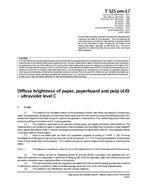Cart 0 Product Products (empty)
No products
To be determined Shipping
$0.00 Total
Product successfully added to your shopping cart
Quantity
Total
There are 0 items in your cart. There is 1 item in your cart.
Total products
Total shipping To be determined
Total
New Reduced price!  View larger
View larger
 View larger
View larger TAPPI T 525 om-17
M00003711
New product
TAPPI T 525 om-17 Diffuse Brightness of Paper, Paperboard and Pulp (d/0)
standard by Technical Association of the Pulp and Paper Industry, 2017
In stock
More info
Full Description
TAPPI T 525 om-17 is for the determination of the brightness of white, near-white, and naturally colored pulp,paper, and paperboard. Brightness is a commonly used industry term for the numerical value of the reflectance factor of a sample with respect to blue light of specific spectral and geometric characteristics. This method requires an instrument employing diffuse illumination and 0 viewing geometry.This method is applicable to all naturally-colored pulps, and papers and board made therefrom. Themeasurement is not suitable for paper or paperboard containing added coloring matter (such as yellow or green dyestuff) which appreciably absorbs light in that part of the spectrum extending from about 400 to 500 nm. This brightness method is not applicable to colored papers.
Pulps to be tested shall be made into handsheets prepared according to TAPPI T 218 FormingHandsheets for Reflectance Tests of Pulp (Buchner Funnel Procedure) or T 272 Forming Handsheets for Reflectance Tests of Pulp (Sheet Machine Procedure). This method can also be used to measure the brightness of machine-dried sheets.
NOTE 1: The brightness of a handsheet will usually be 0.5 to 1.0 units higher than that of a machine-dried sheet made from the same pulp.
1.4 This method utilizes an integrating sphere to provide diffuse illumination and perpendicular (0)observation geometry (1) designated in optical terminology as d/0. With this geometry, specimen surface structure and azimuthal orientation have a negligible effect on brightness.
The instrument has a relatively large specimen aperture for the purpose of averaging small area variations in reflectance, making it possible to obtain a reliable average value with only a few individual measurements.
This method is not intended for use with colored materials.

